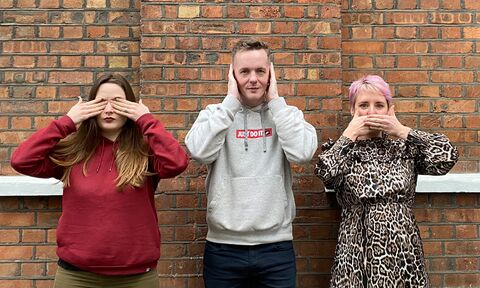Imposter Syndrome Is a Thing
It’s always the same dream.
I’m pulled out my London life to the hideous reality that I never finished high school. Everything is taken away – my career, my university degrees, moving to the UK…
… And I’m back in Florida. I have braces, low self-esteem and have to do my senior year all over again like some sort of warped Billy Madison scenario.
From the moment I wake up, I feel an immediate sense of relief – but I can’t help but shake that lingering feeling of self-doubt. Like I’m still that girl who had to take her SATs multiple times and doesn’t know what she’s going to do with her life. Like I’m some sort of imposter with a flailing self-perception.
It’s everywhere
Of course, I’m not alone in this feeling. Anyone who’s ever worked a creative job – whether you’re a designer, artist, musician, or writer – has likely had that nagging little voice in your head at one time or another (or many times) telling you to question everything you’ve worked for. Maybe the voice tells you that you’re not good enough or have somehow bull****ted your way to this point.
That little voice tends to be an unfortunate side effect to working life, and its name is imposter syndrome. That pervasive feeling that you’re not talented or qualified isn’t uncommon; especially in the creative industries, which are wrought with subjectivity, ladder-climbing and the occasional crush to morale.
With working life, you can often find yourself misaligned in understanding who you are and what your value is. This can be a problem for organisations for several reasons: increasing the change of acute or chronic mental health issues; fearing failure means that employees are less likely to chase innovation; believing your work will never be good enough, increasing chance of procrastination.
Imposter syndrome can be hard to avoid. But the good news is that there are ways to cope with that annoying little voice in your head and all the harmful patterns that come with it.
Accept that you’re not perfect
It’s a bitter, bitter pill to swallow. But when you accept that you’re a normal human being who has weaknesses and experiences the occasional f*** up or failure. The first rule is accepting the fact that you can’t possibly be the best at everything, thus relieving some of the undue pressure you’re putting on yourself.
Acknowledge your thought patterns
You’re not your thoughts. The brain is a powerful thing, and that frustrating voice in your noggin is like the devil on your shoulder. Of course, if you feel belittled or isolated by your superiors at work, this is a separate issue that needs its own examination – especially as it only adds to your negative feelings about your self-worth. Since external validation is an overriding need in those suffering from imposter syndrome, not feeling accepted or external signs of non-approval can make the problem worse.
It helps to practice mindfulness. If meditation or cognitive behavioural therapy help, all the better for it. It’s all about observing your thought patterns and recognising which are helpful and which are unhelpful. The app Headspace is great for guided meditation – especially bite-sized sessions for busy schedules. And if you’re a serial podcast listener like me, How to Fail with Elizabeth Day is an inspiring celebration of failure and how to learn from the things that haven’t gone right.
Don’t keep it bottled up
It helps to talk about these things. I know it’s easier said than done, especially if you’re one to keep your cards pretty close to the chest. But, you’d be surprised at how many creatives deal with imposter syndrome every day. Even just having the knowledge that this is a common struggle can help you feel less alone. Join creative communities like Copywriters, unite! or Design Lab London, which are great spaces to talk with like-minded folk about their own methods for coping.
Or, if you feel up to it, start your own community like the design-goddess, Jessica Walsh. In her creation of Let’s Talk About Mental Health, we’re another step closer to destigmatising mental health and the battles many of us face.
Embrace where you’re at
Imposter syndrome is particularly pervasive for those who are new to the industry or for those who have recently started a new role. Celebrate the stage you’re in at the moment, while keeping your mind open to external learning. Sign up for courses, workshops, online tutorials – anything!
It’s also the responsibility of the employer to not encourage imposter syndrome by setting unreasonable expectations for the individual, and then berate them when they miss the mark or don’t achieve something to a particular standard. It’s a vicious circle.
And if you’ve started a new role, give yourself time to settle in and accept that you won’t know everything straight away. For new creatives, how does the saying go? “It’s not a mistake if you learn from it.” Well, damn right. ?
We're a creative agency in London and Singapore. We help our clients break through the noise. We'd love to hear from you so do drop us a line
